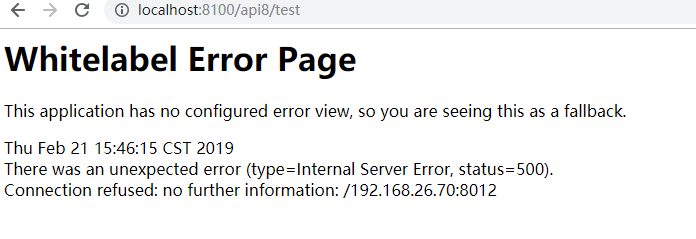篇章要点
本文将介绍Spring Cloud Gateway如何处理全局异常,统一处理经过路由的异常(返回前端json格式)
场景描述
新建 路由Gateway模块:8100和 生产者模块8012(有个test方法)
正常流程访问http://localhost:8100/api8/test ,此时路由转发返回正常数据
但是,但是,如果此时生产者宕机了(假如哈) ,路由 不配置异常处理的化,展现给调用方的是如下页面

配置处理全局异常后 ,此时返回给调用方的是如下页面

结论:网关都是给接口做代理转发的,后端对应的都是REST API,返回数据格式都是JSON。如果不做处理,当发生异常时,Gateway默认给出的错误信息是页面,不方便前端进行异常处理。可见后者友好一些
如何快速配置全局异常
Spring Cloud Gateway中的全局异常处理不能直接用@ControllerAdvice来处理,需自定义一些处理逻辑来符合业务的需求。
很简单就2步:
1.创建JsonExceptionHandler类
import org.springframework.boot.autoconfigure.web.ErrorProperties;
import org.springframework.boot.autoconfigure.web.ResourceProperties;
import org.springframework.boot.autoconfigure.web.reactive.error.DefaultErrorWebExceptionHandler;
import org.springframework.boot.web.reactive.error.ErrorAttributes;
import org.springframework.context.ApplicationContext;
import org.springframework.http.HttpStatus;
import org.springframework.web.reactive.function.server.*;
import java.util.HashMap;
import java.util.Map;
/**
* @Description: ${todo}(用一句话描述该文件做什么)
* @Author: zzh
* @Modified By:
* @Date: 2019/2/21 15:16
*/
public class JsonExceptionHandler extends DefaultErrorWebExceptionHandler {
public JsonExceptionHandler(ErrorAttributes errorAttributes, ResourceProperties resourceProperties,
ErrorProperties errorProperties, ApplicationContext applicationContext) {
super(errorAttributes, resourceProperties, errorProperties, applicationContext);
}
/**
* 获取异常属性
*/
@Override
protected Map<String, Object> getErrorAttributes(ServerRequest request, boolean includeStackTrace) {
int code = 500;
Throwable error = super.getError(request);
if (error instanceof org.springframework.cloud.gateway.support.NotFoundException) {
code = 404;
}
return response(code, this.buildMessage(request, error));
}
/**
* 指定响应处理方法为JSON处理的方法
* @param errorAttributes
*/
@Override
protected RouterFunction<ServerResponse> getRoutingFunction(ErrorAttributes errorAttributes) {
return RouterFunctions.route(RequestPredicates.all(), this::renderErrorResponse);
}
/**
* 根据code获取对应的HttpStatus
* @param errorAttributes
*/
@Override
protected HttpStatus getHttpStatus(Map<String, Object> errorAttributes) {
int statusCode = (int) errorAttributes.get("code");
return HttpStatus.valueOf(statusCode);
}
/**
* 构建异常信息
* @param request
* @param ex
* @return
*/
private String buildMessage(ServerRequest request, Throwable ex) {
StringBuilder message = new StringBuilder("Failed to handle request [");
message.append(request.methodName());
message.append(" ");
message.append(request.uri());
message.append("]");
if (ex != null) {
message.append(": ");
message.append(ex.getMessage());
}
return message.toString();
}
/**
* 构建返回的JSON数据格式
* @param status 状态码
* @param errorMessage 异常信息
* @return
*/
public static Map<String, Object> response(int status, String errorMessage) {
Map<String, Object> map = new HashMap<>();
map.put("code", status);
map.put("message", errorMessage);
map.put("data", null);
return map;
}
}
2.创建配置信息ErrorHandlerConfiguration
import com.gla.datacenter.filter.JsonExceptionHandler;
import org.springframework.beans.factory.ObjectProvider;
import org.springframework.boot.autoconfigure.web.ResourceProperties;
import org.springframework.boot.autoconfigure.web.ServerProperties;
import org.springframework.boot.context.properties.EnableConfigurationProperties;
import org.springframework.boot.web.reactive.error.ErrorAttributes;
import org.springframework.boot.web.reactive.error.ErrorWebExceptionHandler;
import org.springframework.context.ApplicationContext;
import org.springframework.context.annotation.Bean;
import org.springframework.context.annotation.Configuration;
import org.springframework.core.Ordered;
import org.springframework.core.annotation.Order;
import org.springframework.http.codec.ServerCodecConfigurer;
import org.springframework.web.reactive.result.view.ViewResolver;
import java.util.Collections;
import java.util.List;
/**
* 如:停止privider服务后,此时就会出现json提示的异常
* {"code":500,"data":null,"message":"Failed to handle request [GET http://localhost:8100/api8/test]: Connection refused: no further information: /192.168.26.70:8012"}
* @Description: 覆盖默认的异常处理
* @Author: zzh
* @Modified By:
* @Date: 2019/2/21 15:18
*/
@Configuration
@EnableConfigurationProperties({ServerProperties.class, ResourceProperties.class})
public class ErrorHandlerConfiguration {
private final ServerProperties serverProperties;
private final ApplicationContext applicationContext;
private final ResourceProperties resourceProperties;
private final List<ViewResolver> viewResolvers;
private final ServerCodecConfigurer serverCodecConfigurer;
public ErrorHandlerConfiguration(ServerProperties serverProperties,
ResourceProperties resourceProperties,
ObjectProvider<List<ViewResolver>> viewResolversProvider,
ServerCodecConfigurer serverCodecConfigurer,
ApplicationContext applicationContext) {
this.serverProperties = serverProperties;
this.applicationContext = applicationContext;
this.resourceProperties = resourceProperties;
this.viewResolvers = viewResolversProvider.getIfAvailable(Collections::emptyList);
this.serverCodecConfigurer = serverCodecConfigurer;
}
@Bean
@Order(Ordered.HIGHEST_PRECEDENCE)
public ErrorWebExceptionHandler errorWebExceptionHandler(ErrorAttributes errorAttributes) {
JsonExceptionHandler exceptionHandler = new JsonExceptionHandler(
errorAttributes,
this.resourceProperties,
this.serverProperties.getError(),
this.applicationContext);
exceptionHandler.setViewResolvers(this.viewResolvers);
exceptionHandler.setMessageWriters(this.serverCodecConfigurer.getWriters());
exceptionHandler.setMessageReaders(this.serverCodecConfigurer.getReaders());
return exceptionHandler;
}
}总结
异常时如何返回JSON而不是HTML?
在org.springframework.boot.autoconfigure.web.reactive.error.DefaultErrorWebExceptionHandler中的getRoutingFunction()方法就是控制返回格式的,原代码如下:
@Override
protected RouterFunction<ServerResponse> getRoutingFunction(
ErrorAttributes errorAttributes) {
return RouterFunctions.route(acceptsTextHtml(), this::renderErrorView)
.andRoute(RequestPredicates.all(), this::renderErrorResponse);
}
这边优先是用HTML来显示的,想用JSON的改下就可以了,如下:
protected RouterFunction<ServerResponse> getRoutingFunction(ErrorAttributes errorAttributes) {
return RouterFunctions.route(RequestPredicates.all(), this::renderErrorResponse);
}
- getHttpStatus需要重写
原始的方法是通过status来获取对应的HttpStatus的,代码如下:
protected HttpStatus getHttpStatus(Map<String, Object> errorAttributes) {
int statusCode = (int) errorAttributes.get("status");
return HttpStatus.valueOf(statusCode);
}
如果我们定义的格式中没有status字段的话,这么就会报错,找不到对应的响应码,要么返回数据格式中增加status子段,要么重写,我这边返回的是code,所以要重写,代码如下:
@Override
protected HttpStatus getHttpStatus(Map<String, Object> errorAttributes) {
int statusCode = (int) errorAttributes.get("code");
return HttpStatus.valueOf(statusCode);
}
最后
以上就是落后发夹最近收集整理的关于SpringCloud极简入门|Spring Cloud Gateway 的全局异常处理 (8)的全部内容,更多相关SpringCloud极简入门|Spring内容请搜索靠谱客的其他文章。









发表评论 取消回复